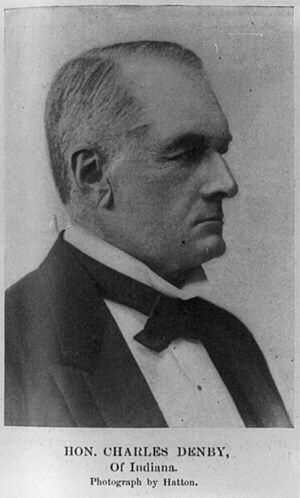Charles Harvey Denby facts for kids
Charles Denby (born June 16, 1830 – died January 13, 1904) was an important person in U.S. history. He was an officer in the Civil War and later became a diplomat, which means he represented his country in other nations. He was the father of Edwin C. Denby, who became a U.S. Representative and Secretary of the Navy, and Charles Denby, Jr., who was also a diplomat.
Contents
Charles Denby's Early Life and Family
Denby was born in a place called Mount Joy, Virginia in Botetourt County, Virginia. His parents were Nathaniel Denby and Sarah Jane Harvey. His grandfather, Mathew Harvey, was a soldier in the American Revolutionary War. Charles Denby went to school at the Tom Fox Academy in Hanover County, Virginia.
Growing Up in France
When Charles was young, his father, Nathaniel Denby, worked for the U.S. government in Marseilles, France. His father was a ship-owner interested in trade with Europe. Charles went with his father to France. There, he attended the College Royal at Marseilles. He became very good at speaking French.
Education and Moving to Indiana
After his time in France, Denby returned to the U.S. He studied at Georgetown College in Washington, D.C.. He also went to the Virginia Military Institute, graduating with high honors in 1850.
After college, Denby moved to Selma, Alabama, where he taught school for three years. In 1853, he moved to Evansville, Indiana. This city became his home for the rest of his life. Evansville was a growing town on the Ohio River.
In Evansville, Denby studied law and worked for newspapers. He also served in the Indiana House of Representatives from 1856 to 1857. While working in the legislature, he met Martha Fitch. She was the daughter of U.S. Senator Graham N. Fitch. Charles and Martha later got married.
Charles Denby's Military Service
When the American Civil War began with the attack on Fort Sumter, Charles Denby quickly took action. He gathered a group of volunteer soldiers. They helped guard the powder magazine near Evansville, Indiana.
Joining the Union Army
On September 12, 1861, Denby became a Lieutenant Colonel. This meant he was the second-in-command of the 42nd Indiana Volunteer Infantry Regiment. He officially started this role on October 10, 1861.
Later, on October 1, 1862, Indiana Governor Oliver P. Morton made Denby a Colonel. This new role was for the 80th Indiana Volunteer Infantry Regiment. However, he didn't officially start as Colonel until October 21, 1862.
Battle and Injury
Because of this timing, Denby was still with the 42nd Indiana when they fought in the Battle of Perryville in Kentucky on October 8, 1862. During this battle, Denby was wounded twice. His horse was also killed right under him. Colonel Denby officially took command of the 80th Indiana by November 22, 1862.
Leaving the Army
On January 12, 1863, Colonel Denby wrote a letter to the army. He explained that he needed to resign because of a severe cramp in his left leg. This cramp made it very hard for him to ride a horse. He said doctors told him there was no cure. He felt he had to return to a life where he could sit more.
I suffer habitually in riding with a very severe cramp in my left leg - walking affords no relief. The cramp is caused by an accident which happened many years ago and the side effects whereof were scarcely felt by me until after I entered the service. I have consulted various medical advisors who uniformly say there can be no remedy. I have therefore no recourse left but to return to a sedentary life.
His resignation was accepted on January 17, 1863. He left the army because of this disability. After the war, Denby became a member of the Indiana Commandery of the Military Order of the Loyal Legion of the United States.
Charles Denby's Political Career
After leaving the army, Charles Denby went back to being a lawyer in Evansville. He was very active in the Democratic Party.
Diplomat in China
When Grover Cleveland became President, Denby was chosen for a diplomatic job. On May 29, 1885, he was appointed as the Minister to China. This meant he was the top U.S. representative in China.
Denby stayed in this important role until 1898. He served under President Cleveland, then Benjamin Harrison (a Republican president), and then Cleveland again. He resigned a little over a year into the presidency of William McKinley. He was the longest-serving U.S. envoy to China at that time.
Work After China
When Denby returned to the U.S. in September 1898, he was given another important task. He was asked to be part of a group that looked into how the Spanish–American War was handled.
Even before that group finished its work, he was chosen for the first commission to the Philippines. This group, called the Schurman Commission, included famous people like Admiral George Dewey and General Elwell Stephen Otis. Their job was to help decide the future of the Philippines.
Later Life and Legacy
After retiring from his official jobs, Charles Denby returned to his home in Evansville, Indiana. He spent his time writing, studying, and enjoying his family life. He passed away suddenly from heart failure at the age of seventy-four. He was in Jamestown, New York, where he had gone to give a lecture.
 | Aaron Henry |
 | T. R. M. Howard |
 | Jesse Jackson |


